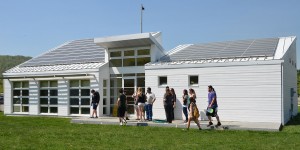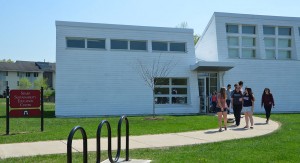- About Ramapo
- Academics
- Admissions & Aid
- Student Life
- Athletics
- Alumni
- Arts & Community
- Quick Links
- Apply
- Visit
- Give
Frequently Asked Questions
 Why should I get an MA in Sustainability Studies from Ramapo College?
Why should I get an MA in Sustainability Studies from Ramapo College?
The program is unique in its interdisciplinary, cohort-based structure. Students learn to apply the skills and knowledge gained to a wide variety of careers including those in ‘traditional’ environmental fields, as well as emerging careers in sustainability in the public and private sector. The Program is taught by a diverse and strong faculty with a broad range of expertise and a trans-disciplinary background, and offers as well the opportunity to work with leading experts in the student’s field of choice.
Can my application still be considered if my undergraduate GPA is below 3.0?
The faculty admissions committee reviews multiple pieces of evidence, undergraduate GPA, resume, references, and the applicant’s narrative statement. A deficit in one area but strengths in others may result in a conditional offer being made. Final selection is contingent on the outcomes of an interview with the Director of the Program.
What background do I need in order to enter the program?
The program is trans-disciplinary. Students with social science, science or business backgrounds are most frequent. However, any background (including engineering, the liberal and fine arts) would be valued if the student demonstrates the desire and motivation to better understand and apply sustainability principles to a range of issues. Recent graduates from a Baccalaureate program, as well as mid-career students who are interested in redirecting their focus toward sustainability issues are encouraged to apply.
Do I beed to take the GREs to qualify for admission?
Experience shows us that GRE scores are not a good predictor of success in the MASS program. Instead, we rely primarily on the Statement of Purpose to adjudicate suitability for the program, aided by supporting documents.
What does my Statement of Purpose need to cover?
We ask that the Statement of Purpose be between two and three pages in length, give us a clear sense of who you see yourself to be, where you are coming from, what you hope to achieve by participating in the program, and where you see yourself headed, five to ten years out. We ask also that your Statement of Purpose indicate potential directionality with regard to your Capstone Project
 Do I need to maintain a minimum GPA in the program?
Do I need to maintain a minimum GPA in the program?
A 3.00 is needed for graduation. If your GPA drops below 3.0, you will be placed on Academic Probation. Please refer to the Graduate Handbook for further details on this.
When can I enter the program?
Because of the sequential nature of the program, we accept new students for the Fall semester only.
How many classes are offered in the Summer?
In the summer between the first and second years, students will enroll in the Sustainability Practicum. This 4-week experience may include Study Abroad or internship opportunities. Each student’s Practicum is a tailor-made opportunity to engage with sustainability practitioners in a field of concern to each individual student.
How long does it take to complete the program?
It usually takes 2 years to complete the program. However, students may opt to take one course each semester, and so proceed at their own pace.
When and where are classes held?
Classes meet once a week, in the evening, at the Sharp Sustainability Education Center.
Will I be able to enter the program if I work full-time?
Yes! Classes are scheduled so that students only need to come to campus once per week, in the evening (6 pm, usually), with the remainder of the course work being delivered on-line. The Summer Practicum options can be tailored to your specific needs.
How large are the classes?
Maximum enrollment in any class is 20 students.
Who teaches in the program?
The faculty at Ramapo have diverse backgrounds in various sustainability-related fields including natural sciences, social sciences, policy, planning and business. The core faculty in the program are drawn from the School of Social Science and Human Services, Theoretical and Applied Science, and the Anisfield School of Business at Ramapo College. Some courses have modules taught by experts drawn from diverse areas of specialization.
Is a thesis necessary?
No. However, students work on their own Capstone projects under the guidance of a specific faculty member and in conjunction with most of the coursework. In the second year, two courses (Project Development in the Fall semester and the Capstone Seminar in the final Spring semester) focus almost entirely on students completing their projects. Students are also encouraged to incorporate their Capstone project into their Summer Sustainability Practicum.
What kind of job can I get with an MA in Sustainability Studies?
Students graduating from the Program will be equipped to work in a diverse range of fields, including sustainability management, education, planning, policy, and food systems. Students will be able to function equally effectively within the domains of local, regional, State and Federal Government, as well as in the private sector in corporations and in consulting firms, or within the non-profit sector in environmental justice and advocacy roles. Mid-career students will be able to return to their field of choice with the additional expertise to apply sustainability principles to their home field.
What is the cost per semester hour for NJ residents? For non-residents?
Current per-credit tuition for New Jersey residents and non-residents is available at the Office of Student Accounts Website.
Can I transfer in courses from other graduate programs?
Because sustainability graduate programs are few and far between, and our program has specific goals and outcomes infused holistically throughout our tightly integrated program, it is unlikely that equivalent courses exist. However, students should consult with the Program Director and also refer to the Graduate Handbook .
Are there any fellowships or scholarships available?
At this time, we do not have financial assistance packages from College sources, except for a single Graduate Assistant position for the Sustainability Education Center. The Assistantship includes tuition and a stipend. Graduate students may be eligible to receive Stafford and Perkins Loans, and are eligible for Federal College Work Study assistance.
Is graduate housing available?
Yes, housing is available for graduate students.
If you did not find what you were looking for then
please fill out our form below and we will respond to you shortly.
Copyright ©2025 Ramapo College Of New Jersey. Statements And Policies. Contact Webmaster.

Follow Ramapo